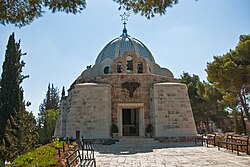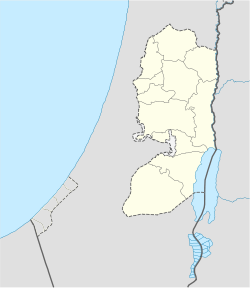Chapel of the Shepherds' Field
| Shepherds' Field Chapel | |
|---|---|
| Sanctuary Gloria in excelsis Deo | |
 The chapel in 2010 | |
| 31°42′26.3″N 35°13′48.4″E / 31.707306°N 35.230111°E | |
| Location | Bethlehem |
| Country | State of Palestine |
| Denomination | Roman Catholic Church |
| Architecture | |
| Architect(s) | Antonio Barluzzi |
| Completed | 1953 |
| Specifications | |
| Number of domes | 1 |
The Shepherds' Field Chapel (Arabic: كنيسة حقل الرعاة; Hebrew: כנסיית שדה הרועים)[citation needed], or the Sanctuary of Gloria in excelsis Deo,[1] is a Roman Catholic religious building in Beit Sahour, southeast of Bethlehem, West Bank, Palestine.[2][3] The chapel commemorates the annunciation of Jesus' birth to the shepherds,[4] said to have taken place in Beit Sahour.[5]
Biblical relevance
[edit]The Palestinian village of Beit Sahour, next to Bethlehem, has been identified by Latin Church tradition as the site of the Annunciation to the shepherds – that is, the place where the announcement of Jesus’ birth to shepherds by angels took place.[6] The area close to the church is also identified as the "Valley of Boaz", mentioned in the Old Testament, in Ruth 2:2, as the place where Ruth gleaned grain for herself and Naomi.[7]
In 1858, the remains of a monastery built around 400 A.D. were discovered, on what was called the "Khirbet Siyar al-Ghanem" – the "Ruins of the Sheep Enclosure" or "Ruins of the Sheepfold").[8] The French official responsible for the excavations claimed to have found the three “shepherds’ tombs” mentioned by a pilgrim who visited Beit Sahour around the year 680. Between 1889 and 1906, the Franciscans succeeded in buying the land.[citation needed]
History
[edit]Roman period
[edit]Franciscan archaeologist Virgilio Canio Corbo excavated the site and found caves with evidence of human habitation during the Herodian and later Roman period, as well as ancient oil presses.[9] Corbo used his findings as arguments in favour of the hypothesis that a small community inhabited the site at the time of Jesus' birth.[9] Murphy-O'Connor concludes that the site was occupied during the first century by nomadic shepherds.[3]
Byzantine period
[edit]Over the Roman-period remnants, a Byzantine monastery was built at the end of the 4th century, which went through a second, rebuilding and expansion phase in the 6th.[3] The monastery was destroyed by the Persians in 614 and was not reoccupied afterwards.[3] The remains were destroyed in the 8th century by Muslims who chiseled off the Christian signs from several stones.[9]
Modern church
[edit]The Shepherds' Field Chapel was built by the Franciscans in 1953.[7] It is not far from the Greek Orthodox Der El Rawat Chapel, commemorating the same event.[10] The Catholic chapel is dedicated to Our Lady of Fátima.[11]
Architecture
[edit]The chapel was designed by architect Antonio Barluzzi.[9] A grotto rises up behind the chapel.[12]
It has five apses that mimic the structure of a nomadic tent in gray. The words of the angel to the shepherds are inscribed gold. An image depicting the birth of Jesus and the adoration of the shepherds can be seen in the place.[13]
Gallery
[edit]-
The chapel
-
Interior
-
Fountain in the courtyard
-
Excavations
-
Access alley
See also
[edit]References
[edit]- ^ "Antonio Barluzzi, el gran arquitecto de la Tierra Santa moderna, "supo traducir en arte los misterios cristianos"" (in Spanish). Fundación Tierra Santa. 17 December 2020. Retrieved 16 May 2022.
- ^ "Midnight Mass at Bethlehem". Magnificat Media. 2015-12-31. Retrieved 2016-05-09.
- ^ a b c d Murphy-O'Connor, J. (2008-02-28). The Holy Land: An Oxford Archaeological Guide from Earliest Times to 1700. OUP Oxford. ISBN 9780191647666.
- ^ webit.it. "Bethlehem - The Shepherds' Field and Grotto". Custodia Terrae Sanctae. Retrieved 2023-08-20.
- ^ webit.it. "Bethlehem - The Shepherds' Field and Grotto". Custodia Terrae Sanctae. Retrieved 2023-08-20.
- ^ webit.it. "Bethlehem - The Shepherds' Field and Grotto". Custodia Terrae Sanctae. Retrieved 2023-08-20.
- ^ a b Tilbury, Neil (1989-10-01). Israel, a travel survival kit. Lonely Planet. ISBN 9780864420152.
- ^ Al-Houdalieh, Salah; Abu A'mar, Ibrahim; Hamdan, Osama; Bennelli, Carla (2014). Case Study of Beit Sahour, Palestine. In: Archaeological minor sites in the Mediterranean basin, Beit Sahur in Palestine, Gadara in Jordan, Vito Soldana and Finziade in Italy. Jerusalem: Al-Adab Press. Retrieved 16 May 2022. (Fig. 18).
- ^ a b c d "Shepherds' Field (via "Bethlehem – Basilica of the Nativity")". Jerusalem: Custodia Terrae Sanctae. Retrieved 16 May 2022.
- ^ Humphreys, Andrew (1996-01-01). Israel and the Palestinian Territories. Lonely Planet Publications. ISBN 9780864423993.
- ^ webit.it. "Bethlehem - The Shepherds' Field and Grotto". Custodia Terrae Sanctae. Retrieved 2023-08-20.
- ^ webit.it. "Bethlehem - The Shepherds' Field and Grotto". Custodia Terrae Sanctae. Retrieved 2023-08-20.
- ^ Jenkins, Ferrell (2013-12-25). "Visiting the shepherd's fields near Bethlehem". Ferrell's Travel Blog. Retrieved 2016-05-09.








